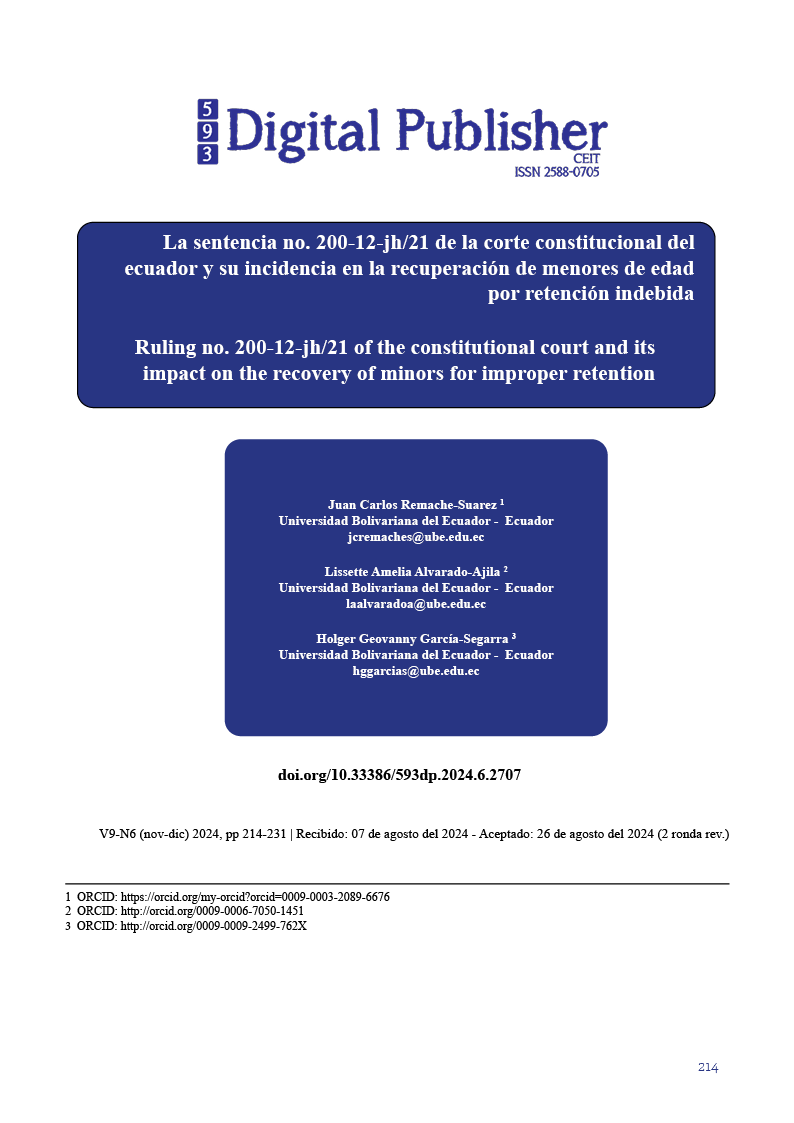Ruling no. 200-12-jh/21 of the constitutional court and its impact on the recovery of minors for improper retention.
Main Article Content
Abstract
The research focuses on the impact of Ruling No. 200-12-JH/21 of the Constitutional Court of Ecuador on the rights of the custodial parent in cases of recovery of wrongfully retained children, based on the growing concern about the violation of rights in these judicial processes, specifically in the parish of Tumbaco, Quito canton. The main objective is to analyze how the sentence affects the rights of the custodian in these cases, identifying the rights of the custodian according to the sentence, evaluate its application in practice, and propose recommendations to improve the protection of these rights. A mixed approach is used, with techniques that include literature review, direct observation in the Family Judicial Unit of Tumbaco, review of court cases and triangulation of methods to validate the results. Historical, exegetical, inductive, and logical methods are used for a comprehensive analysis. The research reveals that the inadequate use of the sentence generates uncertainty and risks of arbitrary decisions, negatively affecting the protection of the rights of the custodial parent and the best interests of the child. It is necessary to improve its application through specific recommendations that strengthen the defense and protection of the rights of the custodial parent and the minor in judicial processes.
Downloads
Article Details

This work is licensed under a Creative Commons Attribution-NonCommercial-ShareAlike 4.0 International License.
1. Derechos de autor
Las obras que se publican en 593 Digital Publisher CEIT están sujetas a los siguientes términos:
1.1. 593 Digital Publisher CEIT, conserva los derechos patrimoniales (copyright) de las obras publicadas, favorece y permite la reutilización de las mismas bajo la licencia Licencia Creative Commons 4.0 de Reconocimiento-NoComercial-CompartirIgual 4.0, por lo cual se pueden copiar, usar, difundir, transmitir y exponer públicamente, siempre que:
1.1.a. Se cite la autoría y fuente original de su publicación (revista, editorial, URL).
1.1.b. No se usen para fines comerciales u onerosos.
1.1.c. Se mencione la existencia y especificaciones de esta licencia de uso.
References
Álvarez, J., & Zuleta, A. (2022). La recuperación internacional de niños, niñas y adolescentes en Ecuador y la carencia de un procedimiento judicial para sustanciarlas. Revista Científica ECOCIENCIA, 9(Edición Especial), 1-23. https://doi.org/10.21855/ecociencia.90.751
Asamblea Nacional Constituyente del Ecuador. (2008). Constitución de la República del Ecuador. Registro Oficial 449 de 20-oct-2008. Ultima modificación: 13-jul-2011. Estado: Vigente. https://www.oas.org/juridico/pdfs/mesicic4_ecu_const.pdf
Bernal, C. (2002). El juicio de la igualdad en la jurisprudencia de la Corte Constitucional colombiana. In J. Vega, & E. Corzo, Instrumentos de tutela y justicia constitucional (pp. 51-74). UNAM. https://archivos.juridicas.unam.mx/www/bjv/libros/1/344/5.pdf
Blacio, K., & Ortíz, D. (2022). Obstaculización al régimen de visitas establecido en el art. 125 del CONA y su incidencia en el derecho constitucional desarrollo integral de niños, niñas y adolescentes del Cantón Santa Elena, año 2021. Universidad Estatal Península de Santa Elena. https://repositorio.upse.edu.ec/bitstream/46000/8592/1/UPSE-TDR-2022-0043.pdf
Carrasco, M. (2020). La definición constitucional del derecho a la tutela judicial efectiva. Revista de Derecho Político(107), 13-40. https://idus.us.es/bitstream/handle/11441/95911/LA%20DEFINICIÓN%20CONSTITUCIONAL%20DEL%20DERECHO%20A%20LA%20TUTELA%20.pdf?sequence=1&isAllowed=y
Célleri, R. (2024). La retención indebida de hijos e hijas como una forma de maltrato infantil en Ecuador durante la última década. Revista Derecho y Sociedad UTE , 1(3), 91–102. https://doi.org/10.29019/rdys.v1i3.1430
Congreso Nacional del Ecuador. (2003). Código Orgánico de la Niñez y Adolescencia. Registro Oficial 737 de 03-ene.-2003. Ultima modificación: 07-jul.-2014. Estado: Vigente. https://www.igualdad.gob.ec/wp-content/uploads/downloads/2017/11/codigo_ninezyadolescencia.pdf
Contreras, C. (2021). Debido proceso e infancia. La participación de niños, niñas y adolescentes en el proceso judicial a la luz de los Derechos Humanos, con especial referencia al derecho a la prueba y el derecho a la sentencia motivada en clave de infancia. Estudios Constitucionales, 19(2), 137-169. https://doi.org/10.4067/S0718-52002021000200137
Cruz, A., & Galarza, D. (2024). Retención indebida del niño, niña y adolescente en el contexto de la sentencia de la Corte Constitucional No. 200-12-JH/21. Universidad Estatal Península de Santa Elena. https://repositorio.upse.edu.ec/handle/46000/11183
Espinoza, E. (2022). La patria potestad en la legislación ecuatoriana. Revista Científica Ciencia & Sociedad, 2(2), 152-162. http://cienciaysociedaduatf.com/index.php/ciesocieuatf/article/view/29
Gálvez, I. (2023). Efectos de la sentencia No 200-12-JH/21. Estudio de caso: Unidad Judicial de la parroquia Mariscal Sucre. PUCE. https://repositorio.puce.edu.ec/handle/123456789/42787
Paz, A., Maldonado, X., & Guevara, S. (2022). Análisis de la tenencia monoparental y el derecho constitucional a la familia en Ecuador. Mundo Recursivo, 5(1), 101-120. https://www.atlantic.edu.ec/ojs/index.php/mundor/article/view/135
Pulido, C. (2003). El principio de proporcionalidad y los derechos fundamentales. Universidad de Externado.
Sánchez, A., & Barrera, F. (2023). Obstrucción del régimen de visitas por parte del progenitor que posee la tenencia del menor. RELIGACIÓN. Revista de Ciencias Sociales y Humanidades, 8(35), e2301012. https://doi.org/10.46652/rgn.v8i35.1012
Sentencia N° 061-15-SEP-CC, 1661-12-EP (Corte Constitucional del Ecuador marzo 04, 2015). http://doc.corteconstitucional.gob.ec:8080/alfresco/d/d/workspace/SpacesStore/99de5d4e-fe6a-4fa3-9e14-4bd8a6c6c4b9/1661-12-ep-sen.pdf?guest=true
Sentencia N° 328-22-EP/22, 328-22-EP (Corte Constitucional del Ecuador diciembre 19, 2022). https://portal.corteconstitucional.gob.ec/FichaCausa.aspx?numcausa=328-22-EP
Sentencia N°. 108-15-SEP-CC, 0672-10-EP (Corte Constitucional del Ecuador abril 08, 2015). https://portal.corteconstitucional.gob.ec/FichaRelatoria.aspx?numdocumento=108-15-SEP-CC
Sentencia N°. 200-12-JH/21, 200-12-JH y acumulado (Corte Constitucional del Ecuador 01 de diciembre de 2021).
Sentencia No. 002-13-SEP-CC, 1917-11-EP (Corte Constitucional del Ecuador marzo 05, 2013).
Villagrasa, C. (2022). Derecho a vivir en familia, potestad parental y responsabilidad institucional en contextos de pandemia. En J. Álvarez, & M. Rocha, Derechos de la niñez y adolescencia en discusión: nueva normalidad, excepción y pandemia (págs. 185-201). Corporación de Estudios y Publicaciones. http://repositorio.dpe.gob.ec/handle/39000/3196
Vistín, E. (2019). Ventajas de la custodia compartida en tiempos de desintegración familiar en el Ecuador. Dominio de las Ciencias, 5(Extra 2), 512-535. https://doi.org/10.23857/dc.v5i2.1105




